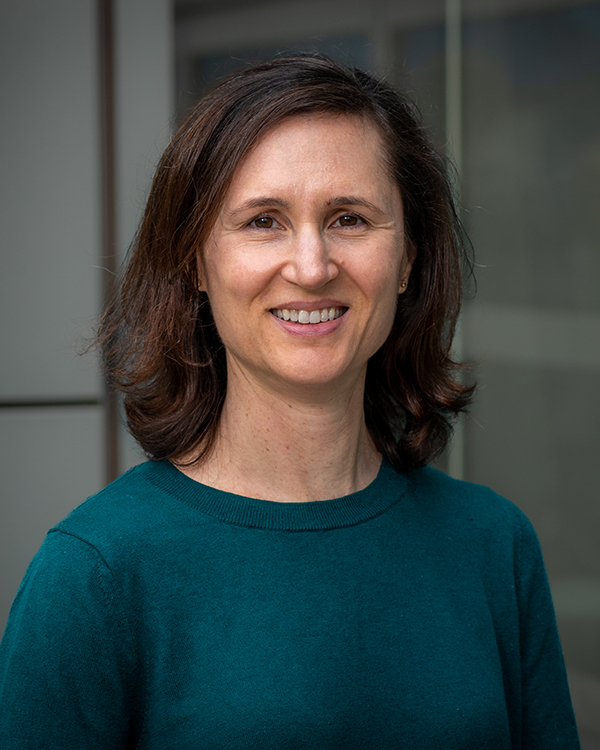
Katie Antypas, Division Deputy, National Energy Research Scientific Computing Center (NERSC), photographed at Lawrence Berkeley National Laboratory (Berkeley Lab), 06/06/2023.
Katie Antypas, division deputy at the National Energy Research Scientific Computing Center (NERSC) at Lawrence Berkeley National Laboratory (Berkeley Lab), has accepted a short-term position at the National Science Foundation (NSF) as the office director in the Office of Advanced Cyberinfrastructure. In that role, her responsibilities will include overseeing the progress, acquisition, and provision of advanced computing and data, as well as networking resources, tools, and services for the academic and educational communities that the NSF supports.
Antypas came to NERSC in 2006 as a consultant in the User Services Group (USG) and has since served as USG group lead, project director for the NERSC-8 project that led to the deployment of the Cori system in 2017, Data department head, and division deputy, in addition to serving as the Exascale Compute Project director of hardware and integration. For the next few years, she will remain a Berkeley Lab employee but will be on assignment to NSF through the Intergovernmental Personnel Act. This allows her to utilize her extensive experience in collaborating with the research community and leading large-scale projects and system deployments, with a focus on providing infrastructure support to researchers at universities nationwide.
“One of my most rewarding roles at NERSC was serving as data department head and engaging with new science communities that had never used advanced and large-scale computing and data resources before,” said Antypas. “We developed and deployed an array of services that enabled these communities to use NERSC systems in novel ways for their scientific research. I believe this experience will be helpful in expanding access to the broad and diverse academic and educational communities NSF serves as well.”
Antypas believes she’ll bring much of what she’s learned and gained from her time at NERSC to the new position, particularly when it comes to the importance of approaching challenges with a broad range of perspectives and skill sets.
“I’ll take the ethos of team science from Berkeley Lab with me,” she said. “I believe we’re stronger when you take ideas from many different areas, and that’s something I’ve always really enjoyed about NERSC. To accomplish the NERSC mission requires a broad range of experts all working together – application and domain scientists, technology and system architects, system software, networking, and storage experts, as well as people who are experts in facilities, electrical, water, and cooling infrastructure. It really takes a team with a full breadth of skill sets to accomplish the mission.”
Because of the deep and broad impact she has had on NERSC over time, Antypas will be much missed during her time away.
“For over a decade, Katie has been a key member of the NERSC leadership team,” said NERSC director Sudip Dosanjh. “She has excelled in a variety of roles, ranging from user services group lead to NERSC-8 project director to division deputy. Her passion and enthusiasm for NERSC’s mission will be sorely missed while she’s away.”
Jonathan Carter, the associate laboratory director for Computing Sciences, said, “I’ve had the pleasure of working with Katie in many different roles over the years. I’ve appreciated her abilities as a quick learner and her skills in figuring out the most important issues to address in complex situations. I will miss her contributions to the Computing Sciences management meetings during her time away. I wish her every success in this new assignment.”
Ultimately, Antypas believes her position at NSF will bring new experiences and ways of looking at challenges that will benefit Berkeley Lab when she returns to NERSC.
“I think NERSC has a really exciting future. There is an incredible amount of disruptive change happening in the field of scientific computing right now: the application of AI to scientific research, the proliferation of new hardware and software technologies, and new business models and companies joining the market, and I see that as very exciting and a big opportunity,” she said. “I appreciate the Lab supporting me in this new assignment, and I know I’ll be able to bring back a new perspective to Berkeley Lab when I return.”
About Computing Sciences at Berkeley Lab
High performance computing plays a critical role in scientific discovery. Researchers increasingly rely on advances in computer science, mathematics, computational science, data science, and large-scale computing and networking to increase our understanding of ourselves, our planet, and our universe. Berkeley Lab's Computing Sciences Area researches, develops, and deploys new foundations, tools, and technologies to meet these needs and to advance research across a broad range of scientific disciplines.

